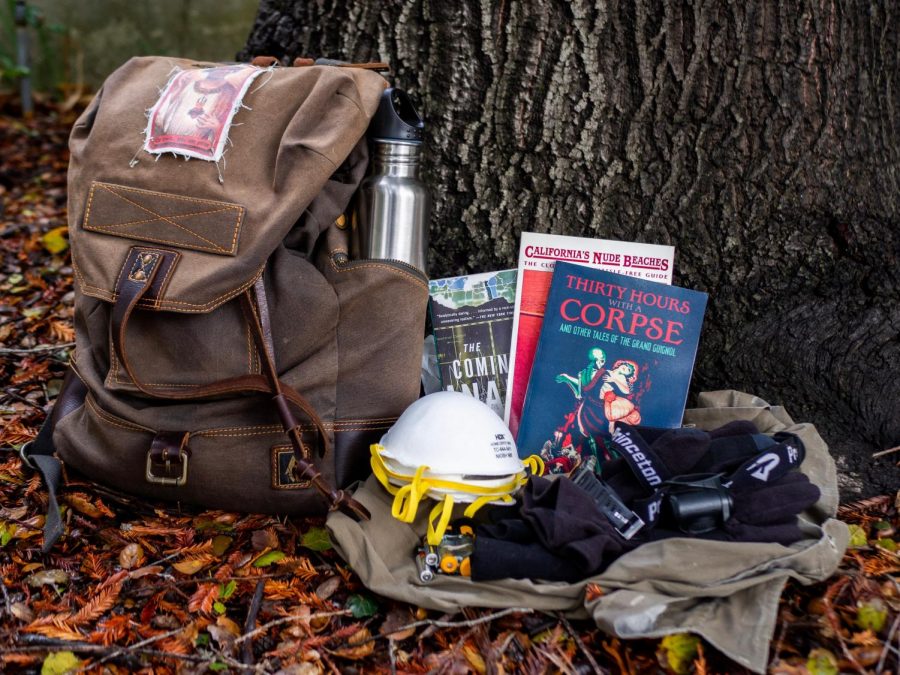Store important survival supplies and low-tech entertainment in a stout backpack you can grab at a moment’s notice.
When it’s time to bug out what to pack when you have to get out of Dodge
Fires. Floods. Power outages. Sonoma County residents live with them all. It’s not whether these events will strike, but when.
How does one best deal with forced evacuations during high-stress situations? Consider assembling a bug-out bag (BOB).
A BOB is a backpack prepacked with items that will keep you alive in an emergency situation. While BOBs should be customized to individual needs, we list a number of standard items below.
Consider storing your BOB in the trunk of your car or in the closet next to your front door, where it will be easy to grab at a moment’s notice.
We would be remiss if we didn’t address cell phones before getting to our list. Most of us use smartphones in today’s world. We assume you have one and use it during an evacuation or emergency, so we aren’t including them on our list. Cell phones are wondrous devices, incorporating many functions traditionally relegated to survival kits.
They contain GPS apps, compasses, radios, scanners and flashlights. Email, texting and WhatsApp are all excellent communication mediums. There are even plant-identification apps and knot-tying apps that can help out in a pinch. Be sure you have your cellphone on you in an emergency situation.
Here are 10 items people in evacuation zones should have stored in a robust backpack that is ready to grab at all times.
Radio: This is a necessity for both information and entertainment. It should be compact and AA or AAA battery-powered, with a backup hand-crank. Seal it in a ziplock bag. Include a spare set of batteries.
Battery Backup:These small, lightweight rechargeable batteries add additional life to your cell phone or other electronic devices. Include a 12-volt adapter so you can recharge your battery bank in a car.
Watch: If your cell phone loses power, or you lose it, you will still need to know the time. Consider investing in a simple, inexpensive battery-powered or wind-up wristwatch.
Cigarette Lighter or Matches: Gas and power can and will be cut during emergencies, and you may find yourself needing to light a propane stove, a campfire, a pilot light, a lantern or — let’s be honest — a joint. Disposable lighters and paper or wooden matches should last indefinitely if stored in a dry, waterproof container.
Water Bottle: You will need a container to hold drinking water. Consider a reusable plastic or stainless steel bottle with a screw-off lid. You can store items inside it while it’s not in use.
Clothing: Pack spare clothing including multiple changes of socks and underwear. Synthetic fabrics like fleece are lightweight and take up little space so consider gloves, thermal underwear and a beanie made of similar fabrics.
Headlamp: A hands-free light will pay for itself in spades your first night out, allowing you to read, pitch a tent and perform any number of normal functions far from the city lights. Pack an extra set of batteries.
Book or Kindle: You may find yourself with a lot of spare time on your hands while stuck in an evacuation center or in Highway 101 gridlock, and a book will go a long way towards occupying your agitated mind. Consider keeping a mass-market paperback or a Kindle in your bug-out bag. A paperback never needs a battery, and a Kindle battery will last for a month. The Kindle advantage: you can store many books on one device.
N95 Mask: A particle mask is a must-have item. Masks rated N95 or higher can help protect your lungs from wildfire smoke, as well as filter dust and mold. These disposable masks usually come in multi-packs. Pack several.
Cash: Keep a roll of at least $100 cash in 20s and smaller denominations, as well as a roll or two of quarters. This will allow you to pay cash for food, gas or lodging — and use vending machines — when credit card machines are down. It will also allow you to pay in exact, or near-exact, change when the store doesn’t have any.
In addition to the items listed above, you should include spare medication, toiletries, ID and credit cards and any other items you deem important.
